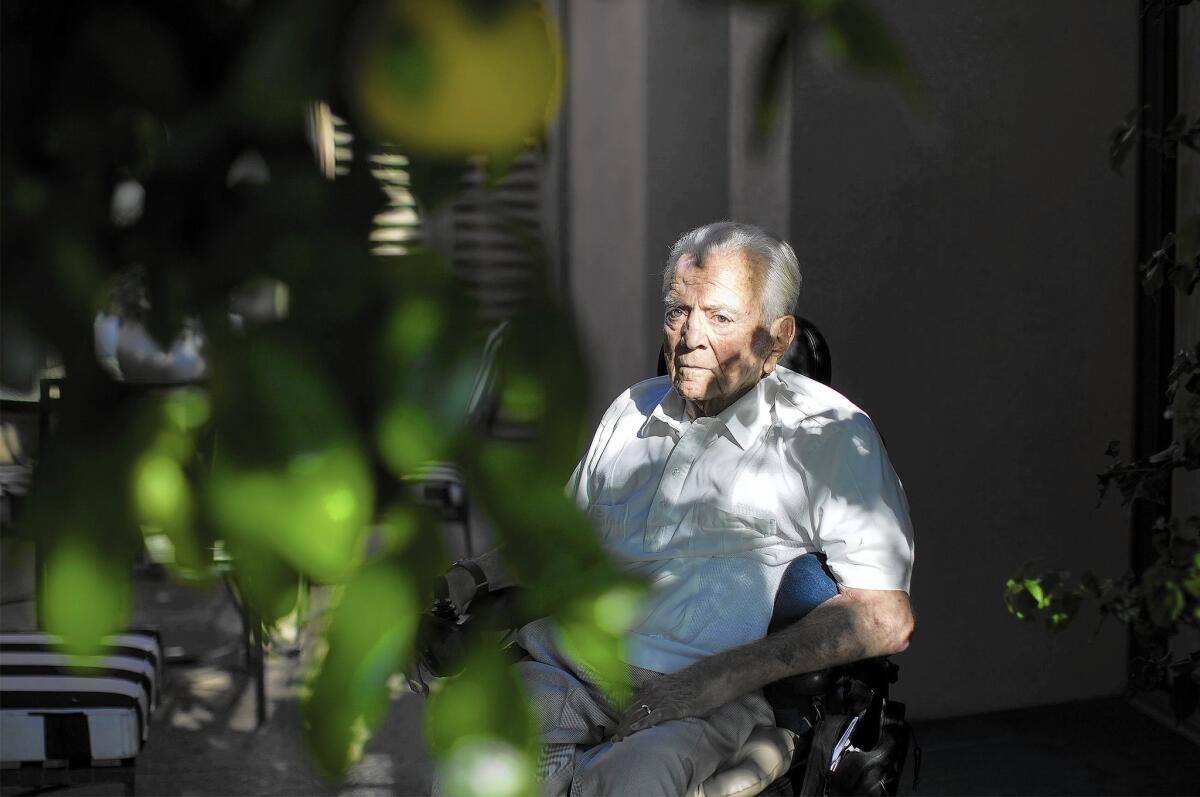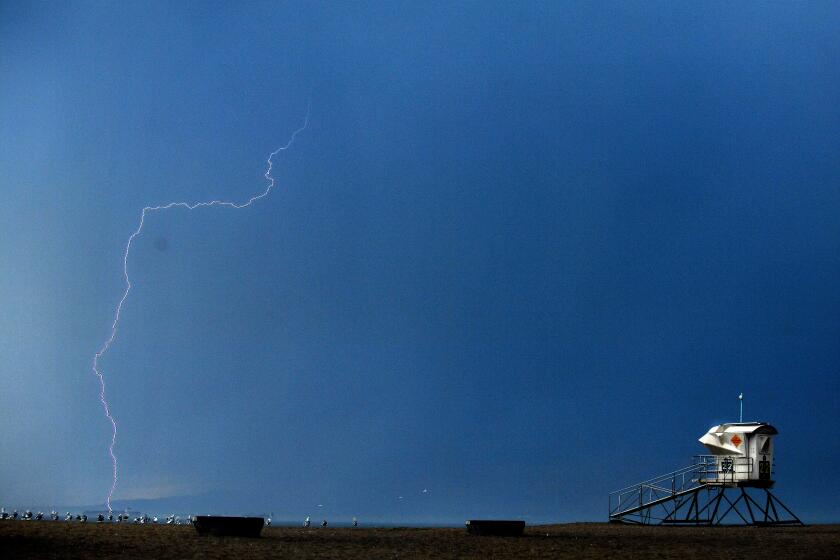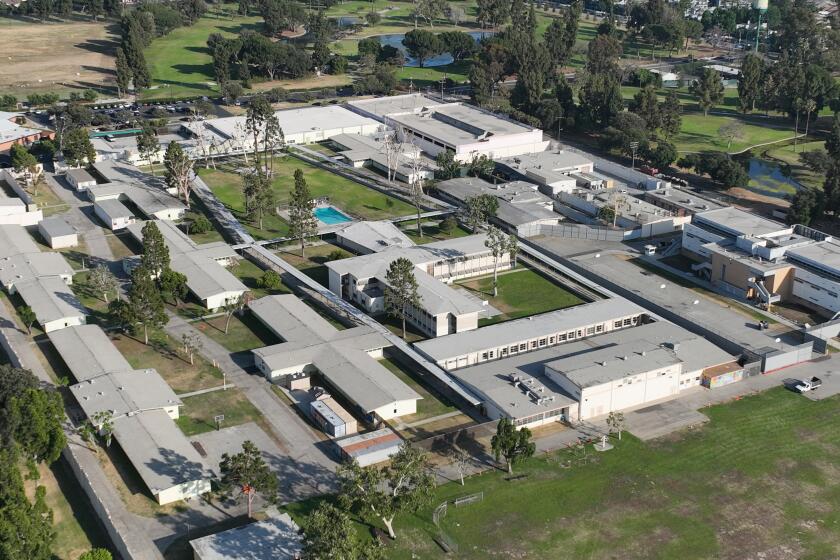Ready to fight: Some growers unwilling to lose land for bullet train

- Share via
Harold Parichan built a reputation as a tough corporate defense attorney when he represented Ford, General Motors and gun maker Sturm, Ruger against some of the biggest product defect allegations in history.
After leaving his lucrative law practice, he turned his attention to growing almonds on about 2,400 acres in the Central Valley. And it’s there that Parichan, 91, has a new opponent: the California bullet train authority. The agency wants some of his land, along with that of doctors, dentists and investors who own Central Valley farms that grow crops worth millions of dollars annually.
When the state chose to start construction of the high-speed rail in the Central Valley, it was based partly on the theory that assembling needed land would be easiest in the state’s rural backbone. As it turns out, some of the farmers most resistant to accepting state offers are proving to be wealthy, highly educated professionals and investors — and formidable opponents in negotiations.
Whether the issues they are raising are valid or intended to drive up prices, their ability to hold out against early offers and threaten lengthy court battles poses costly risks of delay for a $68-billion project facing tight construction and spending deadlines.
Parichan, a Stanford University law graduate, insists he won’t give up any of his prized orchard without a fight. The bullet train route would cut through the middle of seven of his orchards, Parichan said, severing irrigation systems and landlocking about 200 acres from his tractors.
“They are raping my ranch,” he said.
Parichan’s view was echoed in interviews with a wide range of Central Valley farmers and landowners who complained about lowball state offers and the damage their operations will suffer for a project they say may never be completed.
Currently, the high-speed-rail authority is more than two years behind its intended start of construction on an initial 29-mile section that includes bridges, trenches and rail bed. Tutor Perini, the contractor hired for that work, recently announced it is seeking compensation for state-caused delays. Rail agency officials acknowledge they were slow in setting up the land purchase program and have been scrambling to move faster.
In all, the state’s High Speed Rail Authority needs 525 parcels for the first phase of construction. It has completed deals with owners of 123 properties, including Gary Lanfranco, who said he got a fair price for his Cosmopolitan Tavern and Italian Grill in downtown Fresno. Several other disputes have been resolved in recent weeks.
But an additional 154 owners rejected initial offers, and the state began the eminent-domain process to force owners to sell.
A surge of lawsuits over land acquisition could entangle the rail agency in a bottleneck outside its control: local court systems where attorneys say just getting a pretrial hearing can take months.
Valley landowners in the path of the train have a long bill of grievances. Grape farmers say the authority plans to put fences so close to their fields they’ll be required to tear out additional vines to make room to turn their tractors. Cherry farmers say the state will disrupt irrigation systems by cutting off portions of their fields from their wells. A Bay Area investor says the authority wants to take residential property without fully compensating him for potential future rental income. One retired walnut farmer, a migrant from Oklahoma, says the authority will ruin his view across the western expanses of the Central Valley.
A longtime high-speed-rail advocate, Ron Diridon, emeritus executive director of the Mineta Transportation Institute, said disputes over acquiring land for large projects are common. And landowners have bargaining leverage because officials don’t want the added expense of delays once approvals to build are in place, he said.
The authority says it is complying with state law that requires it to pay farmers fair market value. Authority spokeswoman Lisa Marie Alley said any initial offers that failed to compensate owners for future income losses could be remedied in later negotiations.
Dan Richard, the authority’s chairman, said the alternative to the bullet train, the construction of highways, would be more disruptive to agriculture. The authority estimates it needs about 5,000 acres of farmland and says it will protect even more through a program managed by the Department of Conservation.
In lengthy remarks at a rail authority board meeting in May, Richard lamented the project’s effect on farmers. But he added that “it just comes with the territory.”
“We have to make a decision about whether or not there are larger superseding benefits and value that this decision would bring, not only to this community, but to the state as a whole.”
No farmers serve on the high-speed-rail board, and critics contend the state hasn’t sought to engage growers in the planning process. Richard rejects that view, saying extensive efforts have been made to work with farmers.
The authority points to an agricultural working committee it formed to address issues of concern to growers. But the committee hasn’t been active in years, said John Diener, who chaired the panel in 2011 and 2012, when it prepared a technical report on the bullet train’s effects on farming.
“The agricultural community doesn’t feel it gets any real traction in the project,” said Diener, who farms 3,000 acres in Fresno County.
The state has hired four contractors to make appraisals and purchase offers in the Central Valley, although growers interviewed by The Times contended those land agents have limited understanding of their operations.
Rolland Lawrence, a Fresno grape farmer and retired Caterpillar equipment representative, said the rail authority negotiated to pay him for 2.5 acres of his vines but refused to compensate him for a half acre of cultivation that he would lose because he needs space to turn his tractor. The relatively small dispute was settled in recent days, after a six-month delay.
Dennis Kalebjian, a Fresno dentist who grows raisins on a farm built by his father and mother, has been disputing compensation for damage to his irrigation system when the state takes 2.5 acres. The state moved against Kalebjian several months ago with a legal notice, though he hopes a settlement is near, he said in an interview squeezed between appointments with his patients.
“It has been frustrating,” Kalebjian said, adding that he doesn’t want to give up land that his parents worked so hard to make productive.
Frank Olivera, a cherry and walnut farmer, said the rail line would cut diagonally through four of his fields, making it uneconomical to continue growing on half of his 299 acres. Olivera has become a leader in fighting the rail authority, asserting its agents make “flash appraisals” that fail to recognize the extent of damage the project will cause to farms. The authority has been working with Olivera and pledged to address his concerns.
Manuel Cunha, president of the Nisei Farmers League, an association of small family farms, contends the project will destroy 120,000 acres of land from Los Banos to Bakersfield, not the 5,000 claimed by the state.
“High-speed rail is at the bottom of what we want to keep agriculture healthy,” said Cunha, who cultivates citrus on 55 acres. “It has no merit at all for our industry.”
The Madera County Farm Bureau alleged in a legal filing in January that the rail authority reneged on commitments made in an earlier settlement to help farmers. Anja Radabaugh, executive director of the farm bureau, said, “Their appraisals aren’t compensating farmers. They are violating their agreements and robbing people blind.”
So far, the state has not taken legal action against Parichan, but he has hired a former federal judge, Oliver Wanger, to represent him. He contends that the rail authority has made unacceptably low offers for almost two years and that it has refused to say how much of his land in Madera County it wants.
The agency has offered him $29,000 per acre for whatever it does take. Parichan said some of those almond orchards produce net income of more than $8,000 a year per acre, which his financial consultants say should command a purchase price of $60,000 per acre.
“We can fight them because we have deep pockets,” Parichan said during an interview at his second home at the Vintage Club in Indian Wells, where Microsoft founder Bill Gates and billionaire businessman William Koch, among others, have long been his neighbors.
“I love lawsuits. I was in heaven when I tried a case.”
------------
FOR THE RECORD
10:58 a.m., March 14: An earlier version of this article contained an incorrect photo credit accompanying the picture of the almond orchard. The photo was taken by Sue Parichan Habild, not Gina Ferazzi.
------------
More to Read
Sign up for Essential California
The most important California stories and recommendations in your inbox every morning.
You may occasionally receive promotional content from the Los Angeles Times.














